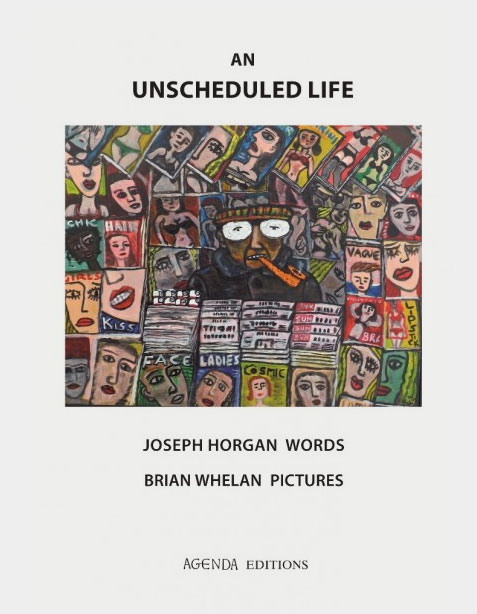An Unscheduled Life is a handsomely produced collaboration between the poet Joseph Horgan and the artist Brian Whelan. Born in Birmingham and London respectively, both men are the sons of Irish immigrants, a fact which colours many of the poems and consequently many of the drawings in this volume. Although this is primarily a poetry review, it should be emphasised that Whelan’s pen and ink drawings have a life of their own and do not in any way merely illustrate the poems. Occasionally a poem and the accompanying drawing will share the same title. However, more often the title of the picture comes from a line or phrase within the poem, so that one presumes that the latter came first. To an extent, the overall effect of the poems and drawings together is reminiscent of the work of Stevie Smith. There is a not dissimilar quirkiness and naïveté, notwithstanding the obvious difference that this is a collaboration between two individuals and that the work is less whimsical and arch than some of Smith’s oeuvre, with a tougher, more urban edge to it.
From the outset one sees how well the words and images work together. The title of the opening poem, ‘There are still stars in the failing sky’, exemplifies Horgan’s lyricism and demonstrates his fine way with a cadence. It also evinces that sense of fitful resilience in the face of failure and disappointment that is a frequent feature of his poems. Evoking a love affair that seems to be over, the protagonist clings to the hope that something may be salvaged: ‘My best kisses were there. / I hope you kept them.’ Aimlessly wandering a city’s nightscape, he comes back to wait outside his beloved’s home: ‘’I’m knocking on the door again. / Come down and let me in.’ This final plea then becomes the artist’s point of departure. With a few deft strokes and a skilful take on perspective he presents us with the foreshortened figure of a nerdy character in specs, who is looking up from the page forlornly. In ‘Notices’ the poet evokes the loneliness of lives alienated by the impersonal sprawl of a great city: ‘People in the city die / in complete silence. / A notice appears overnight, / the details / of an unimagined life.’ Inspired by the phrase, ‘loving care’, which he has lifted from the poem’s labyrinth of endless streets, Whelan presents us with the poignant image of an angel cradling a dove.
Gradually, as the artist’s images and the poet’s incantations draw us into a twilight world of nightshift workers, buskers, and the ‘imaginary love affairs of fading men’, we learn in ‘Growing up Irish’ that ‘behind these streets there is another country.’ Horgan then plays with the complex notion of ‘home’, that highly charged and ambivalent term in any immigrant household. The Anglo-Irish poet Louis MacNeice referred to himself as ‘the man from nowhere’, while Seamus Heaney has used the term ‘bilocation’ to describe that sense of being in two places at the same time:
With doors left slightly ajar our houses,
on Imperial Road or Lower Dartmouth Street,
never closed on a view of somewhere else.
Running away from the swish of First Holy Communion
to a metal slide and concrete interstices overlooked
by those bewildering clusters of high-rise flats.
As if the future had got lost.
Thus we sense that behind Horgan’s cityscapes there is a lost pastoral in which it is just as difficult for him to truly find himself at home:
Going home on the boat was an aberration.
We were to negotiate a different terrain
and coming back again was worse…
In the end Ireland
cut the ground from underneath us.
In ‘Nineteen seventy was a white new year’ the poem’s protagonist remembers the figure of his ‘immigrant father … shovelling clear / the snow-built pavement outside our house.’’ But, then, as if in a brilliant reworking of Seamus Heaney’s ‘Digging,’ the father’s forward thrust and his backward lift’ with the shovel remind the poet of ‘immigrant men driving, digging / their way back home.’ In another poem ‘I met my father in the street and we shook hands’ the poet and his father are Dantesque figures who recognize each other against the city’s teeming backdrop: ‘I’d recognize that swagger anywhere, he said.’ In ‘The biography of Billy Matthews’ Horgan focuses again on the theme of emigration, but through the lens of Browning’s ‘Waring’: ‘Last known sighting? / What was he wearing? / Was there, by any chance, a forwarding address?’ The Irish were, of course, merely the first wave of immigrants to populate Britain’s industrial cities, but have since been followed by many others. ‘Intersection’ is a beautifully poised poem in which Horgan depicts Malik, his representative of a different immigrant community: ‘At the intersection Malik dances, / to a music no one else can hear.’
Now that the young people of Ireland are again leaving their country in droves An Unscheduled Life is a timely collection. Much better educated than their grandparents and certainly more pampered, they, too, must face the hardships of exile at a time of economic meltdown. In poems that have the lyricism of Paul Eluard and the solipsistic austerity of Samuel Beckett Joseph Horgan has created a vision of the city that is unique, memorable and disconcerting.
An Unscheduled Life. Joseph Horgan (Words) & Brian Whelan (Pictures). Agenda Editions. 2012. ISBN: 9781908527073. £9. Buy your copy here

